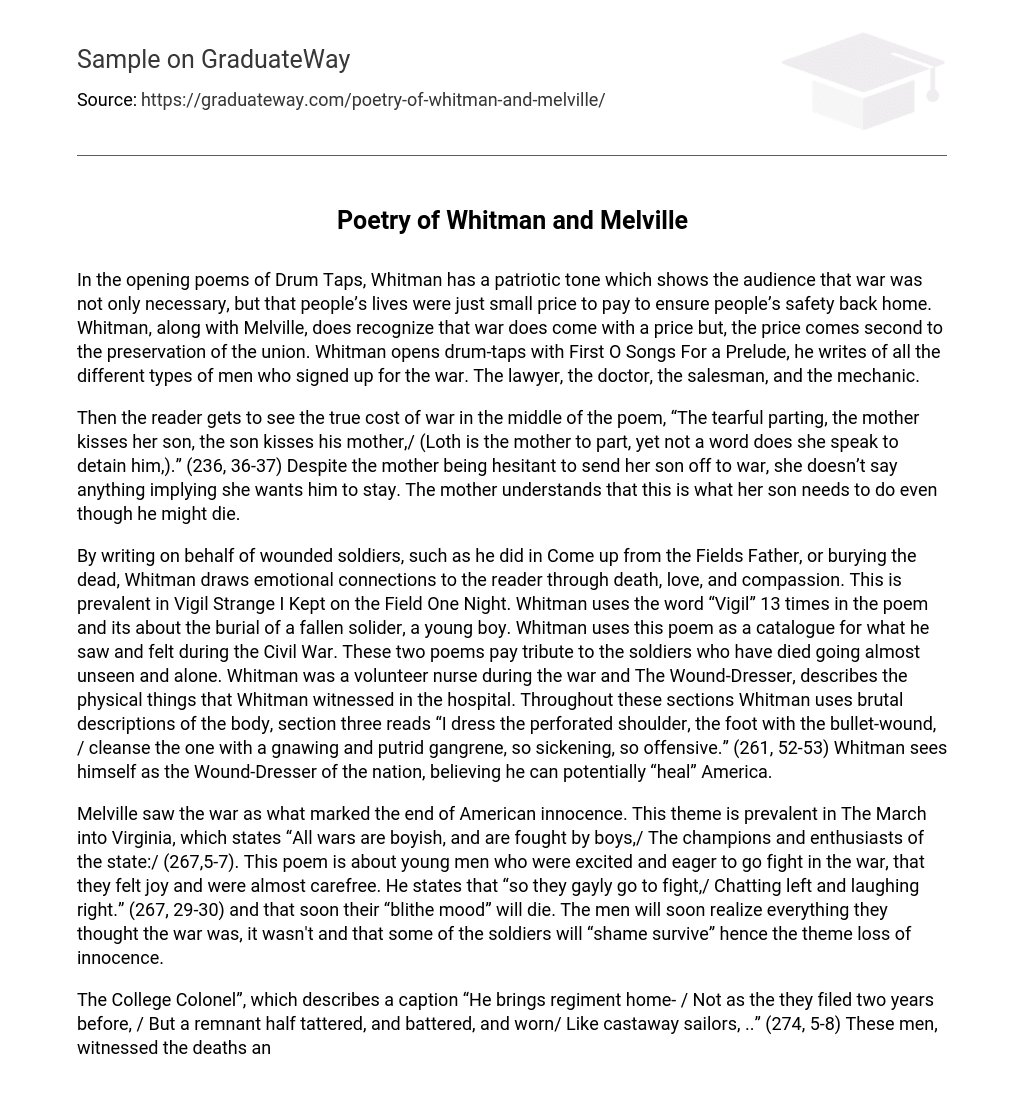In the opening poems of Drum Taps, Whitman has a patriotic tone which shows the audience that war was not only necessary, but that people’s lives were just small price to pay to ensure people’s safety back home. Whitman, along with Melville, does recognize that war does come with a price but, the price comes second to the preservation of the union. Whitman opens drum-taps with First O Songs For a Prelude, he writes of all the different types of men who signed up for the war. The lawyer, the doctor, the salesman, and the mechanic.
Then the reader gets to see the true cost of war in the middle of the poem, “The tearful parting, the mother kisses her son, the son kisses his mother,/ (Loth is the mother to part, yet not a word does she speak to detain him,).” (236, 36-37) Despite the mother being hesitant to send her son off to war, she doesn’t say anything implying she wants him to stay. The mother understands that this is what her son needs to do even though he might die.
By writing on behalf of wounded soldiers, such as he did in Come up from the Fields Father, or burying the dead, Whitman draws emotional connections to the reader through death, love, and compassion. This is prevalent in Vigil Strange I Kept on the Field One Night. Whitman uses the word “Vigil” 13 times in the poem and its about the burial of a fallen solider, a young boy. Whitman uses this poem as a catalogue for what he saw and felt during the Civil War. These two poems pay tribute to the soldiers who have died going almost unseen and alone. Whitman was a volunteer nurse during the war and The Wound-Dresser, describes the physical things that Whitman witnessed in the hospital. Throughout these sections Whitman uses brutal descriptions of the body, section three reads “I dress the perforated shoulder, the foot with the bullet-wound, / cleanse the one with a gnawing and putrid gangrene, so sickening, so offensive.” (261, 52-53) Whitman sees himself as the Wound-Dresser of the nation, believing he can potentially “heal” America.
Melville saw the war as what marked the end of American innocence. This theme is prevalent in The March into Virginia, which states “All wars are boyish, and are fought by boys,/ The champions and enthusiasts of the state:/ (267,5-7). This poem is about young men who were excited and eager to go fight in the war, that they felt joy and were almost carefree. He states that “so they gayly go to fight,/ Chatting left and laughing right.” (267, 29-30) and that soon their “blithe mood” will die. The men will soon realize everything they thought the war was, it wasn’t and that some of the soldiers will “shame survive” hence the theme loss of innocence.
The College Colonel”, which describes a caption “He brings regiment home- / Not as the they filed two years before, / But a remnant half tattered, and battered, and worn/ Like castaway sailors, ..” (274, 5-8) These men, witnessed the deaths and horrors of what comes with war. At the end they discover despite all the bad things they encountered in the war, in the end, they found their peace “Ah heaven! – what truth to him.” (275, 31)
Melville shared the belief with Whitman that, when it came to war, the number one priority of the nation was to work together and preserve the union. One could say they both hoped that after the war, the nation would become a truly united democratic nation and abolish slavery entirely. Whitman’s Drum Taps, is named after the signal for war but could also be the call/song used during ceremonies and funerals; this shows that each individual in the war can be seen as important or accounted for, it could also mean they won’t go unseen.
Both of these men had completely different experiences when it came to the war. Whitman saw first hand what happened to soldiers, not only physically but mentally. One thing that seemed important enough to note was that the poems in Battle Pieces are all in chronological order and almost all of them are written after the war has ended.





